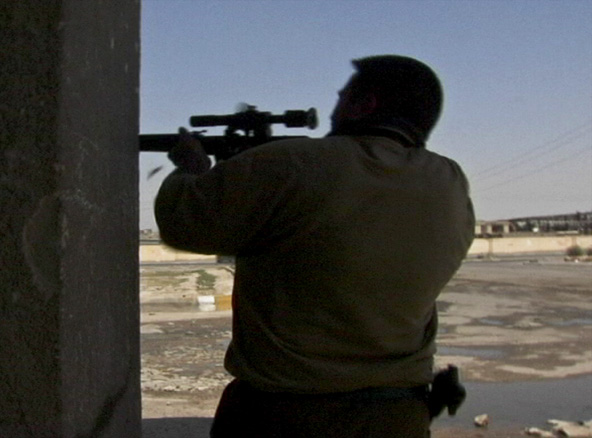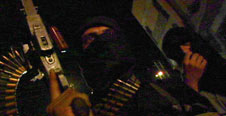
May, 2004, Sadr City, Baghdad. A Mahdi Army sniper prepares to fire at U.S. forces.
Video Still: Andrew Berends/Storyteller productions.
13 April, Baghdad, Iraq.
As we made our approach, fires burned north of town. Smoke from a burning fuel tanker poured into the air that finally stretched out into a gray line over the horizon. We couldn't see much from the air, but on the ground in Falluja, the US Marines were fighting militants for control of the city. But the uprising, because that is what it is, is not only confined to Falluja. In Baghdad, battles with militia loyal to the Shia cleric, Moqtada Al Sadr, were raging in the Sadr city slum. Other Iraqi towns are under the control of his Mahdi Army while refugees streamed out of Falluja on any available road.
It was true long before we landed in Baghdad, the American project in Iraq is failing, and with it much of the hope and optimism that followed the overthrow of Saddam. The city I remembered from a year ago with its long palm-lined boulevards and frantic markets, no longer existed and an echo of Kabul had replaced it. On the way towards Sadoun street and Paradise square, I was turned around and couldn't locate the river. Baghdad has become a tangle of concrete barriers and barbed wire, officialdom and the press has retreated into archipelago of fortified islands. To do this to a city does not seem right under any circumstances, but it is easy to understand why the elite has created the armed enclosures. They are afraid of becoming targets because most of them believe that the project in Iraq will fail. The blast walls are monuments to their pessimism. Of course, it is far easier to hate strangers who live behind a maze of walls. This is what is happening in Iraq now. The kidnappings of foreigners is just the long awaited monster coming out into the open.
On the way into the city from the airport, we drove past the wreckage of a convoy that was still smoking off to the side of the road. A few drivers nearby accelerated to get away from the twisted frame. When the airport van passed it, airport shuttle passengers became quiet and abandoned their excited chatter, hypnotized by the sight of the ruined trucks. I thought that the US, whose careful public relations campaign stressed the reconstruction of Iraq, could not even secure the road to the airport. Too much was happening at once, and there just are not enough soldiers to go around and protect long stretches of road. They are too busy protecting themselves.
I checked into the Palestine, which is a horrible place, but has decent electricity, after walking a mile down the road to get there. No vehicles are allowed near the Sheraton and the Palestine unless they have special clearance so we carried our gear through the checkpoints, run first by Iraqis and at the last stop to the hotel, by US soldiers. No one asked for ID, there was a quick search by young men who joked that they were Mujihadeen, this is typically Iraqi joke, but it could easily be true. Sadoun street is blocked off and closed to people and vehicles. Small groups of kids milled around the checkpoints along with translators. It's easier to think while walking, and in Baghdad, it's possible meet friends or interesting people in random places. It's a city of talkers. But after trying several routes away from the hotel, there was only barbed wire and concrete barriers. It was hard to find way out into the normal part of the city. The only way out of the sealed area was to walk a mile along the river, then cut across Sadoun just before long stretch of razor wire that stopped all traffic on the road.
As I walked down the street, the city's new personality came through, and it was bitter and sullen. It didn't want to talk. I knew this neighborhood as a place where strangers used to greet one another but this convention had become obsolete. Eventually, a worker from Sudan, wearing janitor's uniform walked beside me. "Where are you going?" I told him what I was doing. He didn't understand. For some reason, he was faking a leg injury and every few steps would cry out in agony, perhaps because he wanted me to know that only a fifth of whisky would set things straight. We crossed Sadoun so he could get his liquor, and at the end of a recently created dead end street, where the controlled area ended, two American soldiers waited in an armored personnel carrier. They said they had just arrived from another position. People were staring at us in an unfriendly way.
"Grenades just come out of nowhere. You don't know where they're coming from," One of the soldiers said. The young man manning the APC's gun was mystified by the grenade throwing technique. He added, "We never know who's doing it." Both the soldiers were expecting bad things to happen that night, but they would stay there and guard that edge of the zone. The next morning, I left the Palestine to get away from the barbed wire and the blast walls. It was extremely depressing inside the compound where true security requires emptiness. Around the Palestine, the military engineers had tried to achieve their goal and come very close. The man at the desk wanted to know why I was leaving, but it would have taken too long to explain. On Sunday, the emptiness was everywhere.
In the gloom of the Dulaime lobby, I learned that many people are either leaving, or talking about leaving. The only light comes from the TV which is tuned to Arabic channels, the staff glued to it because many of them have families in Falluja. In the lobby of this place, the guests talk about the kidnappings, because it is difficult to move around the city now for fear of being pulled out of a car, and they have nothing else to talk about. Working in the last few days has become nearly impossible, if work means driving around Baghdad and talking to Iraqis. Going outside Baghdad now is regarded as madness. Roads are sprinkled with checkpoints, but it's not clear who owns them. There is a general sense among the foreign contingent that if the militants start killing the hostages, the whole place will go to hell and there will be a rush for the exits. Everyone pays close attention to the fate of the kidnapped foreigners. We watch Al Jazeera and Al Arabiya for new hostage statements. Lately the Arab channels have been running tape of the bodies of two Americans lying in the street in Falluja. It is hard to tell from the video who they were and what their jobs had been. It is disturbing because there is something triumphant in how Al Arabiya runs the replays the footage.
This assignment lasted six months and I returned home only after covering the siege of the Shrine in Najaf in August.
 LEAD IMAGE: May, 2004, Najaf, Iraq. A group of Mahdi Militia fighters guard the shrine of Imam Ali after taking over the old city of Najaf.
LEAD IMAGE: May, 2004, Najaf, Iraq. A group of Mahdi Militia fighters guard the shrine of Imam Ali after taking over the old city of Najaf.Video Still: Andrew Berends/Storyteller productions
© Phillip Robertson, 2009-2014.
